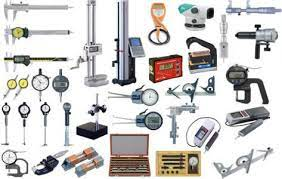Key Factors to Consider When Purchasing Measuring Tools for Quality Performance
Are you in the market for measuring tools to ensure precision and accuracy in your projects? Whether you're a professional tradesperson, a DIY enthusiast, or someone who values precise measurements, selecting the right tools is paramount. With a myriad of options available, it's essential to understand the key factors that contribute to the quality performance of measuring tools. In this guide, we'll delve into these crucial factors to help you make informed decisions and ensure optimal results in your endeavors.
Purpose and Application:
Before diving into the world of measuring tools, it's imperative to define your specific needs and the intended applications. Are you measuring lengths, angles, or volumes? Do you require handheld tools for on-the-go tasks, or do you need more sophisticated equipment for industrial applications? Understanding your purpose will guide you in selecting the most suitable tools for your requirements.
For example, if you're a carpenter working on precision woodworking projects, you'll need measuring tools such as tape measures, squares, and calipers designed for accuracy in woodworking tasks. On the other hand, if you're an engineer working on structural projects, laser distance meters and digital levels may be more appropriate for ensuring precise measurements.
Accuracy and Precision: When it comes to measuring tools, accuracy and precision are non-negotiable. Accuracy refers to how close a measurement is to the true value, while precision relates to the consistency and repeatability of measurements. High-quality measuring tools should offer both accuracy and precision to ensure reliable results.
For instance, a digital caliper with a resolution of 0.01mm provides precise measurements, while a laser distance meter with an accuracy of ±1/16 inch ensures accurate distance measurements over long ranges.
Durability and Build Quality: Measuring tools are often subjected to harsh working environments, so durability and build quality are essential considerations. opt for tools constructed from robust materials such as stainless steel, aluminum, or high-impact plastic that can withstand frequent use and rugged conditions.
For example, a sturdy steel tape measure with reinforced casing is less prone to damage from drops or impacts compared to a flimsy plastic one. Similarly, a solid aluminum framing square maintains its accuracy and integrity even after prolonged use on construction sites.
Ease of Use and Ergonomics: Measuring tools should be intuitive to use and comfortable to handle, especially for tasks that require prolonged use. Consider features such as ergonomic grips, easy-to-read markings, and user-friendly interfaces that enhance usability and efficiency.
For instance, a tape measure with a large, clear scale and a smooth retractable mechanism facilitates hassle-free measurements, while a digital angle finder with a backlit display and intuitive controls simplifies angle measurements in low-light conditions.
Calibration and Maintenance: To ensure continued accuracy and reliability, measuring tools may require periodic calibration and maintenance. Choose tools that offer easy calibration procedures and are compatible with calibration standards to maintain their performance over time.
For example, a digital multimeter with self-calibration capabilities simplifies the calibration process, while a laser level equipped with a magnetic damping system retains its accuracy even in harsh working environments.
Cost and Value: While quality comes at a price, it's essential to strike a balance between cost and value when purchasing measuring tools. Consider the long-term benefits and return on investment offered by high-quality tools compared to cheaper alternatives that may compromise on performance and durability.
For instance, investing in a premium-quality laser distance meter may initially cost more but can result in higher accuracy, increased productivity, and fewer errors, ultimately saving time and money in the long run.
Choosing the right measuring tools is crucial for achieving precision, accuracy, and efficiency in various tasks and applications. By considering factors such as purpose, accuracy, durability, ease of use, calibration, and cost, you can make informed decisions and select tools that deliver quality performance and value for your needs. Remember to prioritize quality over price and invest in tools that empower you to achieve optimal results in your endeavors.




Comments
Post a Comment